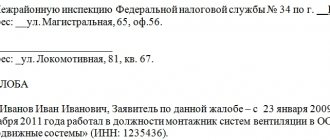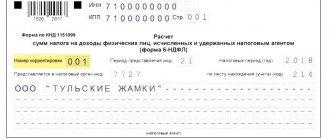A current account is a necessary tool for any modern business. Not only non-cash payments are processed through the account, but also other payment methods, for example, by card or electronic money. Blocking a current account by the tax office is a ban on using the funds of an organization or. In what cases is it possible and how to avoid such an unpleasant situation?
In what cases does the tax office block an account?
There are four grounds for blocking a company account:
- Based on the results of the tax audit, additional taxes were assessed and a decision was made to impose tax liability. If there is reason to believe that the company will not pay additional taxes, the inspectorate may take interim measures in the form of suspending transactions on bank accounts.
- The company did not submit a tax return within 10 days after the last deadline.
- Within 10 days, the company did not provide the opportunity to receive tax documents in electronic form.
- The inspection sent the company a request to provide documents or explanations, but the company did not send a receipt to the inspection for acceptance of this request within 10 days.
Deadline for lifting the block if the cause was violations of electronic document flow with the Federal Tax Service
Unblocking an account when eliminating violations related to the electronic circulation of documents between the taxpayer and the Federal Tax Service is carried out in the same order:
- Elimination of the violation that served as the basis for the suspension of expense transactions.
- No later than the next day - the tax authority makes a decision on cancellation.
- Sending the decision to the credit institution on the same or subsequent business day.
- Removal of blocking by the bank.
Unblocking period is from one to three working days. In this case, the beginning of its calculation is the day of submission to the tax receipt of receipt of documents or the date of submission of documents requested by the inspectorate.
When is it illegal to block an account?
Judicial practice knows cases where companies managed to prove that blocking an account was illegal.
The company did not submit the declaration, despite the fact that there was no obligation to submit it
The company was registered. Along with the registration documents, a notice of the transition to a simplified system was submitted. However, in fact, the company did not switch to a simplified system. During the year, she provided tax reporting under the general taxation system, including VAT returns.
The tax office accepted these reports without any questions, but at the end of the year, when the company did not submit a declaration under the simplified tax system, it blocked its current account.
The company went to court to challenge the decision to block the account. The court supported this requirement, since the company, despite the fact that it submitted a notice of transition to a simplified taxation system, did not actually switch to it and worked on the general taxation system.
Consequently, the company had no obligation to file a declaration under the simplified tax system. In this case, the inspectorate blocked the account illegally.
The company did not provide advance income tax calculations; the inspectorate blocked the current account
In this case, the Federal Tax Service relied on subparagraph 1 of paragraph 3 of Article 76 of the Tax Code.
The company had to go all the way to the Supreme Court, which, unlike previous instances, noted that this legal norm does not provide the tax authorities with the opportunity to block an account in case of failure to submit an advance payment calculation.
A tax return and an advance payment calculation are different documents. In case of failure to submit a tax return, the inspectorate may block the account, but for failure to submit an advance payment calculation, it cannot.
The inspectorate assessed additional taxes based on the results of the audit. The value of the company's property exceeded the amount of the arrears, but the tax authorities still took interim measures in the form of suspending transactions on bank accounts. However, by virtue of the law, if the value of the company’s property exceeds the amount of debt, then the inspectorate cannot block the account. She can block the account only for the amount of the difference between additional charges and the value of the assets.
The inspectorate blocked the account due to procedural violations
For example, the inspection revealed tax arrears. After that, she made a demand for payment of arrears. The company has 10 days to make voluntary payment. As long as the period allotted for voluntary payment of the debt has not expired, the tax office cannot block the company’s account. Blocking becomes possible only if the company voluntarily fails to pay the tax.
What is a r/s arrest?
The seizure of current accounts involves the complete cessation of transactions involving the expenditure of funds in the account. It becomes impossible to withdraw or transfer money. At the same time, funds continue to arrive on the account in the standard mode. You can't just block an account. You need good reasons for this.
- Seizure may be imposed by the tax service. This is relevant if there are tax arrears, or the Federal Tax Service suspects that the sources of the funds being credited are illegal. The right of the tax service to block an account is set out in Article 72 of the Tax Code of the Russian Federation. This method is considered effective in influencing the debtor. The owner of the enterprise, under the threat of stopping all business processes, will have to pay all taxes.
- Another option for arrest is the presence of debt. Debt itself does not lead to blocking. Freezing of accounts is carried out on the basis of a writ of execution. You can get it through the court. Funds from the account are used to pay off existing debt. If funds are received into the account, they will also be used to offset the debt.
- The banking institution itself can block the account if there are factors indicating that the company is laundering funds. Reasons for suspicion may include large receipts in foreign currency, frequent transfers to individuals or other organizations, transfers to the accounts of persons whose activities are recognized as extremist or terrorist.
How to unblock an account?
Essentially, there are only two options:
- comply with tax requirements. In this case, you need to take a certified account statement and payment from the bank and submit them to the tax office;
- prove that the tax office blocked the account illegally. To do this, you need to carefully analyze the situation, see what the tax office refers to when blocking, and especially carefully check the deadlines - was the inspectorate too hasty in blocking the account? Maybe the deadline for voluntary repayment of tax debt has not yet expired?
Is it possible to open another account to replace the blocked one?
Clause 12 art. 176 strictly prohibits the bank from opening other current accounts, deposits, if there is a tax demand to suspend operations. For this, the bank faces severe penalties.
IMPORTANT INFORMATION! At the moment, an Internet service is under development, with the help of which banks will immediately have access to information about tax decisions regarding the seizure of accounts, and unscrupulous taxpayers will not be able to open new accounts in any bank, even by changing the company name and current account number.
How to punish the inspectorate for illegally blocking an account?
The company may request from the tax authorities:
- Interest for each day of illegal account blocking. Moreover, there are two options - if the account was blocked illegally, then the inspectorate must pay interest starting from the first day of blocking. The second option is if the account was blocked legally and the company eliminated the violation, but the tax office was late in unblocking the account. In this case, you need to demand interest for each day following the day on which the account should have been unblocked.
- Losses, including lost profits.
In order to receive interest from the inspection, the company is not required to prove that the illegal blocking caused damage. Interest is collected regardless of damage. Judicial practice speaks about this.
Everything is clear with percentages. They are calculated according to the key rate of the Central Bank, which at the time of writing this article is 7.25%. But with losses, including lost profits, it’s more interesting. Judicial practice has revealed 3 cases when a company has a good chance of recovering lost profits:
- The company was unable to place money in the deposit
There is a sensational case where the Metro company sued the tax authorities for 1.9 million rubles. losses. The fact is that the company was going to place about 3 billion rubles. in the form of bank deposits. But she was unable to do this because the account was blocked, which, as it later turned out, was illegal.
In order to receive lost profits from the tax authorities due to the inability to deposit money, you will need to prove in court that the company even tried to deposit money.
- The company was unable to pay the loan, and the bank charged penalties and interest
Everything is clear here - the company was unable to pay due to an illegally blocked account, therefore, the bank assessed penalties and fines due to the fault of the tax office.
There are two important points here. The court will side with the company if it had enough money to pay the loan. If a company does not have enough funds to pay, it would not be able to pay regardless of whether its account was blocked or not. And secondly, if by the time the tax office made a decision to block the bank’s license, the bank’s license was revoked, the court will side with the inspectorate. After all, when a bank’s license is revoked, the company is deprived of the opportunity to manage its money, regardless of whether the account was blocked or not.
- The company lost a counterparty due to the tax authorities illegally blocking the account
For example, the company was unable to pay under the contract and the counterparty terminated it. How to justify the amount of damages in this case? You need to look at the terms of the contract and calculate the expected amount of profit.
Special Moment
When communicating with tax authorities on the issue of unblocking an account, you should be extremely careful in your statements and behavior. Even if the freezing of money was due to the fault of a tax inspector, you should not get personal and insult tax officials. A scandal may result in a fine under clause 1 of Art. 20.1 of the Code of Administrative Offenses of the Russian Federation for petty hooliganism - 500 rubles, but also a fine under Art. 319 of the Criminal Code of the Russian Federation for insulting government officials - 40 thousand rubles. or compulsory work up to 360 hours.
If the taxpayer could not restrain himself and rudely expressed his dissatisfaction on social networks or forums, thereby offending the tax service, he may also be held accountable. For insulting the authorities, punishment is provided under Art. 20.1 Code of Administrative Offenses of the Russian Federation - fine up to 100 thousand rubles. (for repeated violation - up to 200 thousand rubles), as well as arrest for up to 15 days.
conclusions
The tax office can block an account for various reasons : when the company has not submitted a tax return to the inspectorate;
has not provided the opportunity to receive tax documents in electronic form or does not send a receipt to the inspectorate regarding receipt of the request. Often, the tax office blocks an account without legal grounds . To unblock an account, you need to either comply with tax requirements or send a complaint to the Federal Tax Service justifying the illegality of blocking.
If the tax office blocked the account illegally or did not remove the blocking on time , then it must pay interest and compensate for the damage caused.
Whom the bank may consider a suspicious client?
Operations are considered questionable if, according to “Methodological recommendations of the Central Bank No. 18-MR dated July 21, 2017”:
- transactions are made that do not comply with the statutory activities of the company;
- funds are received for a short time and in an amount of less than 600 thousand rubles. (not falling under the minimum value of the controlled amount in accordance with Article 6 of Law No. 115-FZ);
- expenses that are usual in carrying out activities, for example, employee salaries, rent, utility bills, etc., are not debited from the current account);
- There was a sharp intensification of incoming and outgoing transactions.
On a note! Non-standard reasons for blocking an individual entrepreneur's current account may be the age of the entrepreneur - younger than 20 or older than 75 years.
Banks that rarely block current accounts of individual entrepreneurs and LLCs
Below is a list of banks with the most favorable conditions in Russia.
| Bank | Opening cost in rubles | Maintenance cost in rubles (every month) |
| Modulbank | 0 | from 0 |
| Dot | 0 | from 0 |
| Tinkoff | 0 | 0 (first 3 months, then from 490) |
| Sberbank | 0 | from 0 on the “Easy Start” tariff |
| UBRD | 0 | from 400 on the Economy tariff |
| Loko Bank | 0 | from 0 on the “Start” tariff |
| Vesta Bank | 0 | from 0 on the “Startup” tariff |
| Oriental | 0 | from 495 on the “Your Start” tariff |
All tariffs







